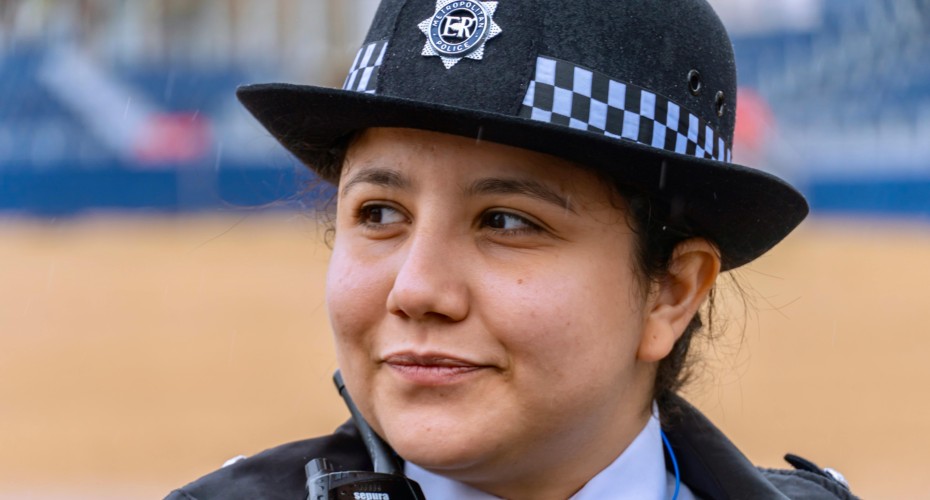Police officers face twice the risk of traumatic brain injuries and PTSD, survey finds

Police officers are more than twice as likely to have traumatic brain injuries compared to the general population. Officers who incur these injuries while on duty face more than double the risk of developing complex post-traumatic stress disorder (PTSD).
That’s according to a new survey-based study from the University of Exeter, published in The Journal of Head Trauma Rehabilitation, which found a connection between traumatic brain injuries and PTSD in police officers. Authors say the findings raise concerns over the long-term effects on officers’ personal and professional lives and highlights the need for better action and support for officers who have sustained a head trauma in the workplace.
Professor Stan Gilmour has 30 years’ experience in law enforcement and received The King’s Police Medal for his service. He is now a Senior Research Fellow at the University of Exeter and co-convenor of the Global Law Enforcement and Public Health Association’s Neurodisability Special Interest Group. Stan said: “Police officers are exposed to high-stress situations, physical confrontations, and the possibility of injury every day. Adding to that the increased risk of traumatic brain injuries and PTSD only compounds the challenges officers already face, and this study highlights the urgent need for better monitoring of head injuries and their long-term effects.”
The study surveyed 617 current serving frontline police officers from England, Scotland, and Wales and found 38 per cent had sustained at least one traumatic brain injury – defined as an injury to the head that caused someone to lose consciousness, or develop symptoms such as confusion, disorientation, or memory loss. This is compared to the rate of 12 per cent found in the general population. Of those officers, 61 per cent report they had experienced these types of injuries on multiple occasions.
Researchers found police officers who reported a history of multiple traumatic brain injuries were more than twice as likely to meet the criteria for complex PTSD – which has similar symptoms to PTSD, but may also include feelings of worthlessness, shame and guilt, problems controlling emotions, and relationship issues. In the study, 22 per cent of respondents had sustained traumatic brain injuries during their policing duties and these officers were more than twice as likely to develop probable complex PTSD.
The results found police officers with a history of multiple traumatic brain injuries also face more severe difficulties in their daily lives, including their ability to perform work duties, maintain relationships, and carry out other important activities like parenting. They also reported physical and cognitive symptoms at a more severe level, including headaches, fatigue, sleep disturbances, and concentration problems.
The study calls for assessments for traumatic brain injuries and related symptoms during routine occupational health checks, with targeted interventions for officers who experience both a traumatic brain injury and PTSD.
Nick Smith, lead researcher and Postdoctoral Research Associate at the University of Exeter, said: “Our findings highlight a critical gap in support for police officers who suffer traumatic brain injuries and PTSD. Many officers are grappling with the lingering effects from past injuries while simultaneously managing PTSD symptoms and this creates a double burden that can significantly impair their ability to work, have healthy relationships, and overall quality of life.
“Early action and support are essential to prevent long-term consequences and improve outcomes for these officers. For example, police forces could emulate concussion guidelines in sport by developing traumatic brain injury assessments and graduated return-to-duty protocols, which are crucial to reduce risk of further injury when still symptomatic.”
The survey is the largest of its kind to examine the link between policing, traumatic brain injuries and PTSD, and included participants from across the UK. As the research was survey-based, the data is self-reported – however, researchers took steps to ensure it was not obvious to respondents that they were investigating links between head injuries and PTSD. The study entitled “Co-occurrence of Traumatic Brain Injury and Post-Traumatic Stress Disorder in a National Sample of UK Police Officers: Impact on Social Well-being and Employment Outcomes” was funded by the Engineering and Physical Sciences Research Council and is published in the Journal of Head Trauma Rehabilitation.
“Something had changed in my mentality”
Tim Ockenden is a current serving Police Sergeant who developed PTSD following a road traffic collision while on duty. In November 2022, Tim was driving with a colleague on a blue light run when they were hit by another car going through traffic lights.
“After I was physically checked after the incident, I came back into work the next day,” Tim said. “I tried to crack on like normal, but something wasn’t quite right. Something had changed in my mentality. I really noticed a shift in my behaviour, and I’d get angry at the drop of a hat. I couldn’t put my finger on what was wrong. I’d never been an anxious person before, but I started to get anxious.”
Tim was then off work for three months with stress and burnout and around the same time his wife gave birth to their son.
“I was absolutely loving my home life, but I would also turn on a dime,” he continued. “It probably got to its worst about five months after the incident when I was in the shops with my wife and son, and she was asking me what I wanted for lunch. I couldn’t process it, and I just lost it. I got really angry and shouted at my wife, which I’d never done before.
“She told me I’d changed over the past few months and around the same time a colleague pulled me aside and said, ‘nobody wants to work with you. Nobody wants to even sit in the same office as you. You need to get some help because something’s not right’.”
Tim sought help through official work channels and his GP surgery, but was told support could take months or even longer. He then reached out to independent charity Police Care UK.
Tim said: “By the following week I’d spoken to somebody on the phone and by the end of the week I’d had a clinician assessment. Two weeks later I started therapy for PTSD. It’s made a massive difference, sort of resetting myself, and I’m back to relative normality now. But I can still get angry really easily, which I never used to before. I can sense my PTSD symptoms building and if I don’t correct them in time I lose it.”
Tim says from what he’s experienced as a police officer, the findings from the research don’t surprise him: “For me, this study is long overdue because I think there are huge numbers within the police with undiagnosed PTSD. I’m a big rugby fan and I’d like to see some sort of protocol put in place similar to the head injury assessment in sports. Something that isn’t subjective but a pass or fail and identifies if someone is at risk PTSD. Then it’s equally important what care is in place after that is identified.”
“Those two things need to go hand in hand – the protocol and then the treatment. People can’t wait six months. If you fail the test on the Monday, then on the Tuesday you’re getting help.”



